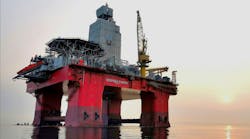Federal regulations on hydraulic fracturing would provide a necessary baseline for states where onshore unconventional oil and gas development has not taken place yet but will soon, US Sec. of the Interior Sally Jewell said. Interior also would possibly accept more-stringent requirements than some states have enacted already, she told the US House Natural Resources Committee.
"I have fraced wells. I understand there can be problems. We need updates to 30-year-old regulations, but they need to recognize contributions by states," Jewell said in her opening statement at a hearing examining DOI's overall operations.
Baseline standards covering flowback control, wellbore integrity, and other basic requirements are needed at the federal level, she said in response to a question from Rep. Doug Lamborn (R-Colo.), who chairs the committee's Energy and Mineral Resources Subcommittee. "If the states meet or exceed those standards, we'll accept their rules," Jewell said.
Responding to a question by committee member Cynthia Lummis (R-Wyo.), she said the US Bureau of Land Management, which is seeking comments on proposed federal onshore fracing regulations, is getting many questions about how exemptions would work. When Lummis expressed concern that the federal government might not recognize when a state already has an aggressive fracing regulatory system, Jewell replied: "We know Wyoming has one that's superior."
Committee member Matthew Cartwright (D-Pa.) disputed oil and gas industry assurances that fracing is inherently safe. He criticized BLM's proposal to use FracFocus, which he characterized as inadequate and industry-funded. FracFocus is a web site that was developed by the Interstate Oil & Gas Compact Commission and the Groundwater Protection Council, both of which are comprised of state government representatives.
Minimum standards
"We're talking about minimum federal standards. They are out for comment," Jewell said. "We don't believe it's practical in all cases to get advance notice of ingredients before operations commence, but we will demand proprietary information when necessary. We recognize some states have more stringent standards and support them."
Committee member Frank Pallone Jr. (D-NJ) expressed concern that another DOI agency, the US Bureau of Ocean Energy Management, would proceed with seismic testing off the Mid-Atlantic coast without adequately considering possible adverse impacts on fish and marine mammals.
The National Oceanic and Atmospheric Administration has a new study under way, he told the secretary. Pallone urged her to direct BOEM to not complete its environmental impact statement for Mid-Atlantic seismic activity until NOAA's study is complete and its findings can be incorporated.
But Jeff Duncan (R-SC), another committee member, said decades of studies have found no significant impacts on fish and marine mammals from seismic tests, and suggested Pallone's recommendation was another delaying tactic by opponents of Mid-Atlantic offshore oil and gas resource evaluation. "The next 5-year plan will begin to be developed in 2014, which is awfully late for including seismic studies in it," he added.
"Everyone I've talked to about the Mid-Atlantic says they believe seismic studies will be completed in time to be included in the next 5-year plan," Jewell responded.
Virginia's offshore
Rob Wittman (R-Va.) noted that both of his state's US senators and most of its House delegation wants to make certain Virginia's offshore also is seriously considered. Jewell's predecessor, Ken Salazar, canceled a scheduled lease sale off Virginia following the 2010 Macondo deepwater well incident and spill in the Gulf of Mexico.
She said she's not aware of any prohibition to evaluating resource potential off Virginia's coast. "This is noncontroversial. As far as I know, it will move ahead," Jewell said.
She noted that more rigs are working now in the gulf than before the 2010 incident and spill, which nevertheless was a wakeup call to improve federal offshore oil and gas oversight. "I will say there may be opportunities to streamline permitting, and we are looking into them," she added.
